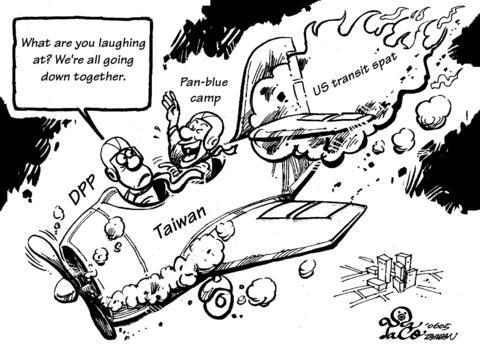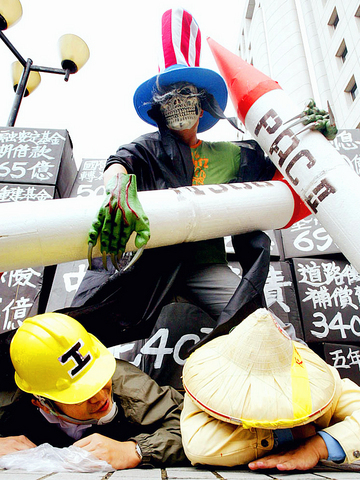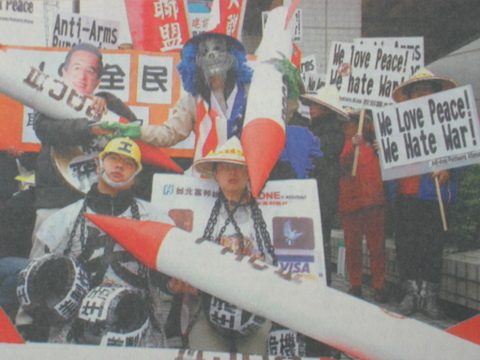You’re takin’ this very personal. Tom, this is business, and this man is takin’ it very, very personal.
— Sonny Corleone
For the last three weeks, the KMT and its allies have been trying to make an issue out of American diplomat Stephen Young’s utterances in an effort to divert attention away from their blocking of the special arms budget. When Young said it was impolite for People First Party chairman James Soong to heckle Taiwan’s president during National Day, the PFP and some members of the KMT began making noises about deportation. Their calls to have Young declared persona non grata intensified when he delivered a speech in which he stressed the urgency for Taiwan to pass a "robust arms package" by the end of the fall legislative session. Young’s statements, they objected, amounted to interference in Taiwan’s internal political affairs.
(The China Post printed four hysteric anti-Young / anti-American letters between October 28th and the 30th. They can be reviewed here.)
The sniping at Young hasn’t been limited to threats of expulsion, however. Just forget that the KMT blocked the special arms bill 68 times over the last two years – that’s irrelevant. Because suddenly, it’s all YOUNG’S fault that the KMT’s blocking weapons for Taiwan:
Kuomintang lawmakers [claimed] the warnings Stephen Young…issued would "adversely affect" the progress of the necessary deliberation.
"Now that the ultimatum has been given, we cannot afford to adopt the bill at once," said Tseng Yung-chuan, the Kuomintang legislative caucus whip. If it does, he added, the Kuomintang will be called "a chicken."
What a terrific way to rationalize delay and to try to smear Young in front of his superiors, all at the same time. We’d really like to move on this, America – really we would – but that guy you sent over sure is making it tough for us to get the job done. Maybe you’re not aware of this, but here in Taiwan, it’s considered an INTOLERABLE loss of face to take the garbage out after your wife asks you to.
(Especially if she’s already asked you 68 times in a row.)
Monday’s papers also reported the KMT employing a bit of poll-a-ganda in a transparent effort to make Young look bad:
"Young’s remarks have made the passage of the bill uncertain. It’s inappropriate to let it through at this moment, as a media survey had found that 65 percent of the public disapproves of Young," [said Tseng Yung-chuan, director of the KMT policy department.] *
My, my, they really ARE trying to make this thing personal. Problem for them is, Young’s bosses have got his back:
Asked at the daily department press briefing on Friday whether Young still has US Secretary of State Condoleezza Rice’s confidence, spokesman Sean McCormack said that "he’s doing a good job" and the department has no plans to recall him from his Taipei post.
The State Department also issued a statement after the press briefing, in which a department official said Young’s comments "reflect the United States’ long time encouragement of an increase in Taiwan’s overall defense spending and for funding a strategy that reinforces stability in the Taiwan Strait."
"Director Young’s remarks are fully consistent with long-held US positions and are based on our assessment of Taiwan’s defense needs," it said.
It’s not personal, Sonny. It’s strictly business. I wouldn’t call this merely a defense of Stephen Young; I’d call it a warning. Should Young be expelled, Washington won’t view it as the "legitimate" comeuppance of an impolitic diplomat – an act confined in importance to a single individual. Instead, it’ll be seen as the rejection of an official who is faithfully and accurately representing American positions – an act of open contempt for American interests.
But hey, the KMT claims Young has a 65% disapproval rating with the Taiwanese public. So go ahead and knock yourselves out, guys.
* The KMT has played this little game with President Chen’s approval ratings as well, announcing on previous occasions that Chen’s low numbers provided them with sufficient reason not to bring the special arms bill to a vote.
UPDATE: The KMT on Monday decided to tell America to shut up and sit down:
…the legislature’s [KMT-dominated] Foreign and Overseas Chinese Affairs Committee passed a resolution asking the US Department of State to create measures restraining its diplomats’ remarks in Taiwan, saying that Young’s statement had violated diplomatic courtesy and could be interpreted as interference with Taiwan’s internal affairs.
(Yes I know, the KMT didn’t literally tell America to keep silent; they instead told Stephen Young to hold his tongue. But Young only delivered a message that the American government WANTED delivered. So in a very real way, telling Young to shut up is tantamount to telling the American government to do so as well.)
What’s remarkable here is that it was only five months ago that the KMT was high-fiving America for punishing President Chen for abolishing the National Unification Council, and one month ago that it BEGGED America to ask Chen to resign during the heat of the redshirt protests.
KMT outrage over American "interference" is nothing if not selective.
The Taipei Times elaborated on the measure:
The resolution said that it was designed to prevent US diplomats from hurting the feelings of the people of Taiwan and harming Taiwan’s democracy.
It was passed to prevent the feelings of the Taiwanese from being hurt? Somebody ought to tell the KMT that ever since they started pal-ling around with the Communist Party of China, they’ve even begun SOUNDING alike.
UPDATE (Nov 5/06): From Johnny Neihu’s Saturday column, a State Department official is questioned by an anti-Young Taiwanese reporter:
Question: Based on the strong reaction from Taiwan’s opposition, under such circumstances, Mr. Stephen Young is — seems to be a liability rather than an asset. So do you have any — under such [sic] current situation, do you have any plan to recall him or anything else?
Mr. McCormack: No.
Question: Does he [sic] still have confidence in him?
Mr. McCormack: He’s doing a good job.
You’ve heard of push polling, right? This is typical Taiwanese "push reporting" — or asking leading questions — in which a reporter turns a personal opinion ("seems to be") into a statement of fact ("under such current situation"). Most responses can then be twisted to make the reporter’s opinion look like fact in the write-up, though Sean McCormack in this case very professionally chose not to play the game.
If you watch the video on the State Department Web site, you can sense the contempt McCormack feels toward his interrogator. And my spy in Washington tells me there was some embarrassment among the other reporters.
He’s doing a good job. Not quite the answer the reporter was fishing for.
UPDATE (Nov 10/06): A Monday column in the Taipei Times had this point to make:
If one looks at the current arms deal as a simple business transaction, how is it unreasonable for a seller to offer the buyer a last chance to make the purchase after he or she has gone back on promises and dragged out the negotiations?
How could this be construed as "political interference?" Opposition politicians could always come out and say clearly that they don’t want to buy the US’ weapons and be done with it.
Barring any future statements by Mr. Young, this story has pretty much played itself out. The KMT has turned its attention back to their attempts to recall President Chen, and campaigning against an American diplomat represents a distraction from that effort.
UPDATE (NOV 11/06): From Thursday’s Taiwan News:
KMT Legislator Lin Yu-fang, a member of the defense committee, said his party reached a consensus two months ago to back the purchase of the aircraft. [the 12 P3C Orion anti-submarine planes offered in the special arms package].
So they reached consensus to support part of the package two months ago, but it took Stephen Young’s arm twisting to finally get them moving. Even the KMT is now admitting that they’ve been playing political games with this for a while.


